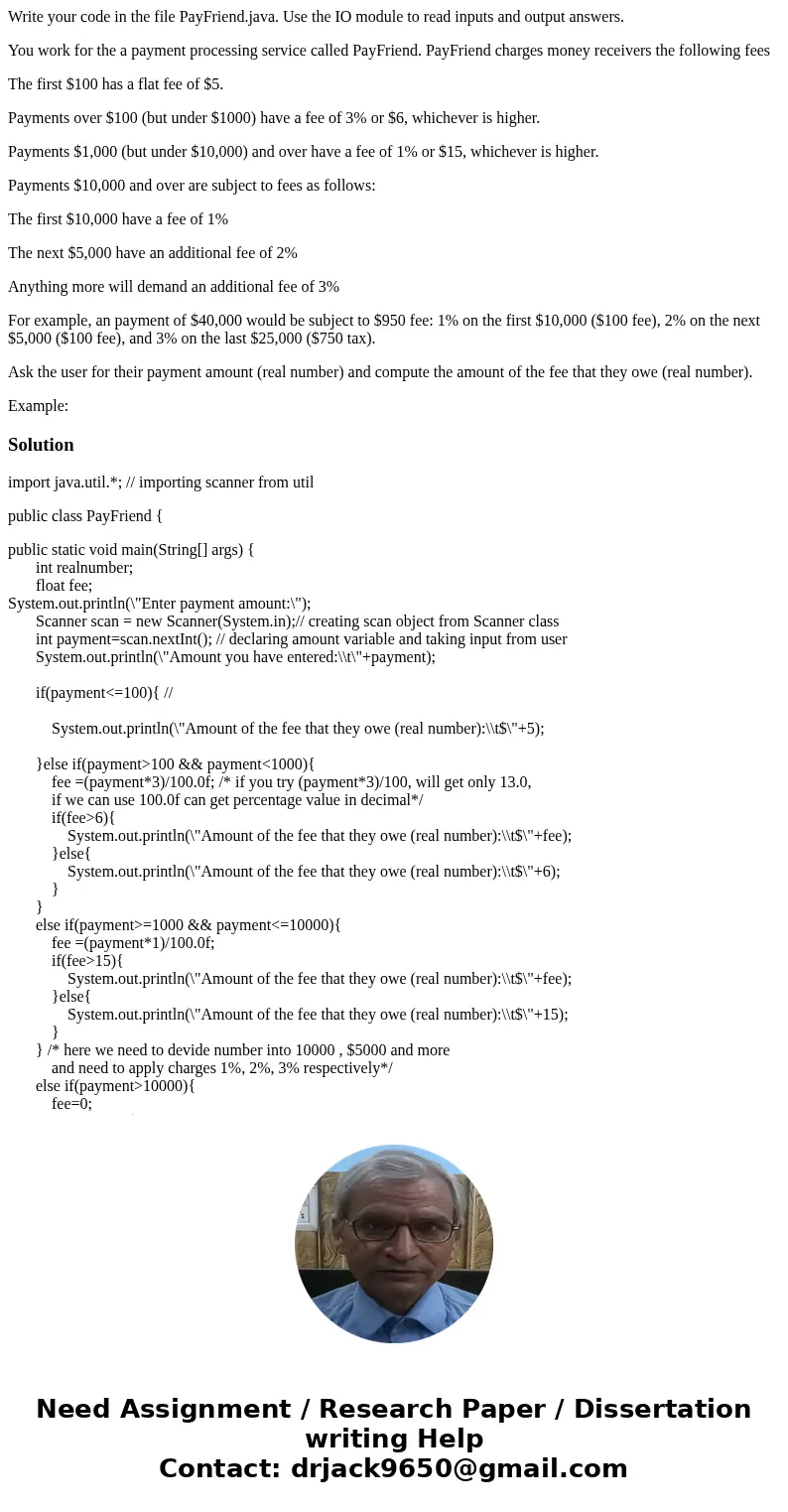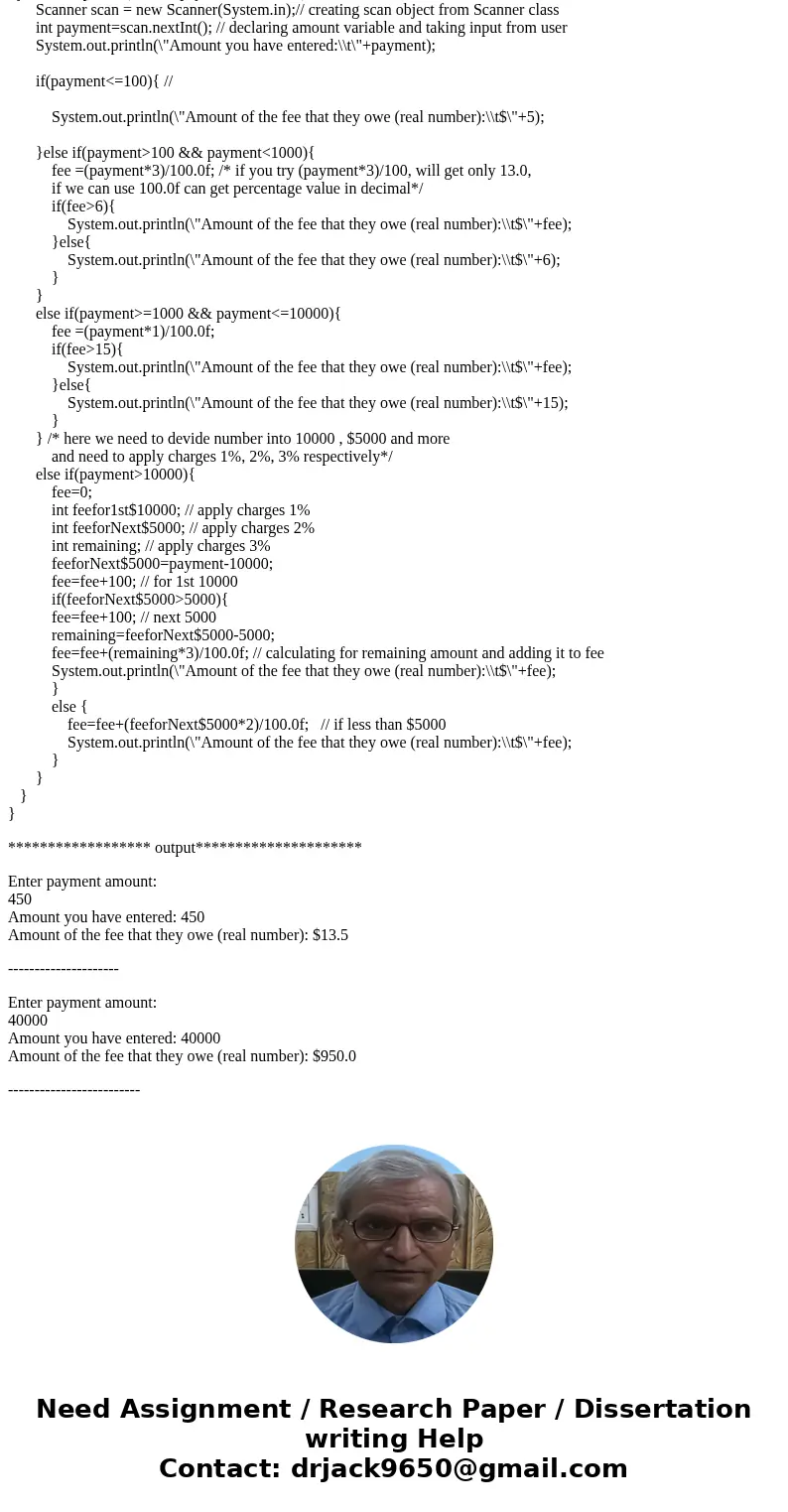Write your code in the file PayFriendjava Use the IO module
Write your code in the file PayFriend.java. Use the IO module to read inputs and output answers.
You work for the a payment processing service called PayFriend. PayFriend charges money receivers the following fees
The first $100 has a flat fee of $5.
Payments over $100 (but under $1000) have a fee of 3% or $6, whichever is higher.
Payments $1,000 (but under $10,000) and over have a fee of 1% or $15, whichever is higher.
Payments $10,000 and over are subject to fees as follows:
The first $10,000 have a fee of 1%
The next $5,000 have an additional fee of 2%
Anything more will demand an additional fee of 3%
For example, an payment of $40,000 would be subject to $950 fee: 1% on the first $10,000 ($100 fee), 2% on the next $5,000 ($100 fee), and 3% on the last $25,000 ($750 tax).
Ask the user for their payment amount (real number) and compute the amount of the fee that they owe (real number).
Example:
Solution
import java.util.*; // importing scanner from util
public class PayFriend {
public static void main(String[] args) {
int realnumber;
float fee;
System.out.println(\"Enter payment amount:\");
Scanner scan = new Scanner(System.in);// creating scan object from Scanner class
int payment=scan.nextInt(); // declaring amount variable and taking input from user
System.out.println(\"Amount you have entered:\\t\"+payment);
if(payment<=100){ //
System.out.println(\"Amount of the fee that they owe (real number):\\t$\"+5);
}else if(payment>100 && payment<1000){
fee =(payment*3)/100.0f; /* if you try (payment*3)/100, will get only 13.0,
if we can use 100.0f can get percentage value in decimal*/
if(fee>6){
System.out.println(\"Amount of the fee that they owe (real number):\\t$\"+fee);
}else{
System.out.println(\"Amount of the fee that they owe (real number):\\t$\"+6);
}
}
else if(payment>=1000 && payment<=10000){
fee =(payment*1)/100.0f;
if(fee>15){
System.out.println(\"Amount of the fee that they owe (real number):\\t$\"+fee);
}else{
System.out.println(\"Amount of the fee that they owe (real number):\\t$\"+15);
}
} /* here we need to devide number into 10000 , $5000 and more
and need to apply charges 1%, 2%, 3% respectively*/
else if(payment>10000){
fee=0;
int feefor1st$10000; // apply charges 1%
int feeforNext$5000; // apply charges 2%
int remaining; // apply charges 3%
feeforNext$5000=payment-10000;
fee=fee+100; // for 1st 10000
if(feeforNext$5000>5000){
fee=fee+100; // next 5000
remaining=feeforNext$5000-5000;
fee=fee+(remaining*3)/100.0f; // calculating for remaining amount and adding it to fee
System.out.println(\"Amount of the fee that they owe (real number):\\t$\"+fee);
}
else {
fee=fee+(feeforNext$5000*2)/100.0f; // if less than $5000
System.out.println(\"Amount of the fee that they owe (real number):\\t$\"+fee);
}
}
}
}
****************** output*********************
Enter payment amount:
450
Amount you have entered: 450
Amount of the fee that they owe (real number): $13.5
---------------------
Enter payment amount:
40000
Amount you have entered: 40000
Amount of the fee that they owe (real number): $950.0
-------------------------


 Homework Sourse
Homework Sourse